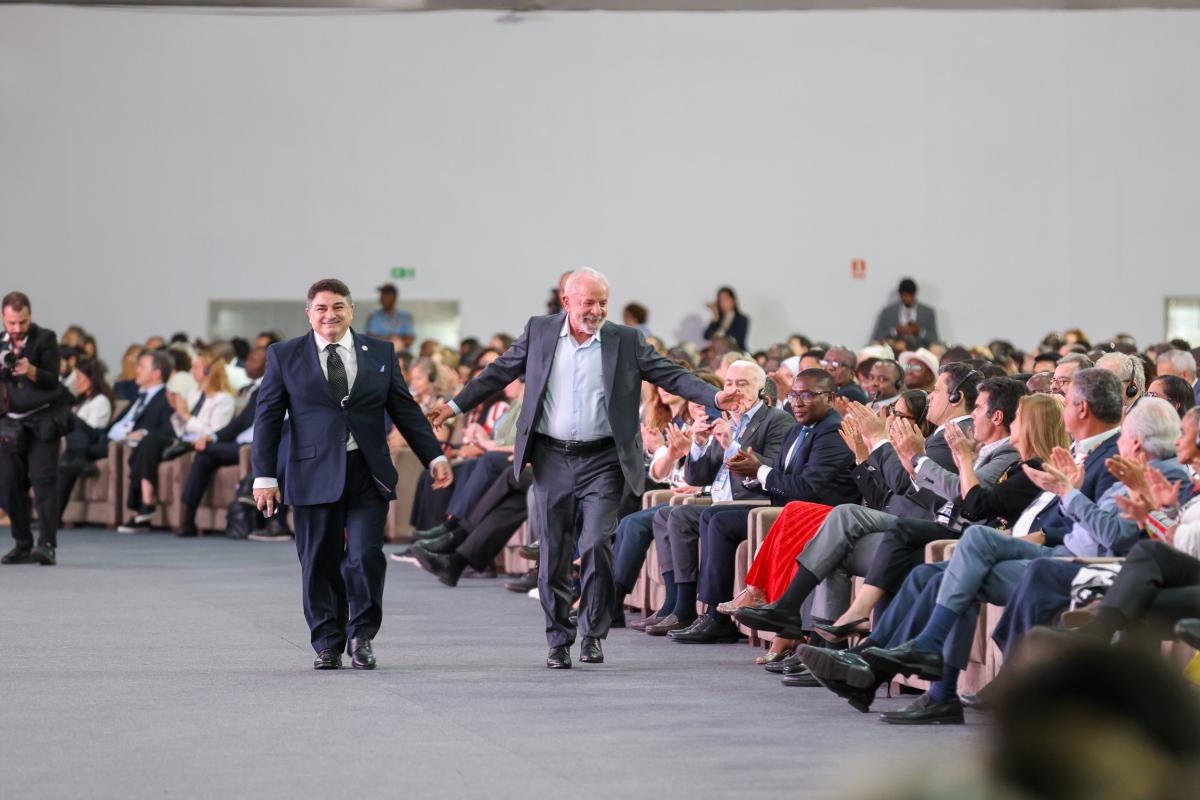With the end of this week almost upon us, we are looking at the halfway point for this year’s ‘climate summit’, COP30 at Belém in Brazil at the edge of the Amazon and the mouth of the Amazon River. Unfortunately, the Summit so far underlines the difficulties faced by multilateralism in the current global order and the particular difficulties in advancing climate change action. But there yet be a few ‘green shoots’ here at this gathering providing some hope of progress on this critical issue.
As described by Cathrine Osborn at the FP:
“Tens of thousands of participants from more than 190 countries and dozens of Indigenous groups are staging two weeks of meetings, protests, and negotiations during this year’s summit, known as COP30.”
“The annual climate conference, held this year in Belém, is the first since U.S. President Donald Trump returned to the White House and triggered the United States’ second exit from the 2015 Paris Agreement. This time, Trump has gone beyond withdrawing from international climate diplomacy and is actively working to undermine it. U.S. sanctions threats last month against envoys from countries on the verge of reaching a landmark deal to limit global shipping pollution succeeded in blocking the agreement.”
Much of the news headlines in the runup to the opening of COP30, which commenced with two days of meetings of leaders, was about who was not there. Yes there was obviously much written about Donald Trump but there was more as noted by WPR:
“The heads of four of the world’s five top polluters—China, the United States, India and Russia—declined to attend, even though those four countries account for nearly half of the world’s greenhouse gas emissions.”
Most notably of course was President Trump but then additionally leaders from other major powers all failed to show as well. Nevertheless, in the lead up to COP30 plans were prepared for action. Probably most notably was the effort to save the Amazon rainforest. As described by John Ainger and Jennifer A Dlouhy at Bloomberg:
“Brazil’s main plan to protect the Amazon rainforest — the centerpiece of its COP30 climate agenda — is moving ahead, though initial funding falls well short of expectations.”
“The Tropical Forest Forever Facility, or TFFF, designed to support the conservation of endangered forests worldwide, will receive around $5 billion in pledged contributions — far short of its $25 billion target. Norway and France have agreed to join Brazil in investing in the fund.”
Now the plan here gives a nod to more innovative thinking on achieving the necessary goals. As described by Daniel Carvalho, Dayanne Sousa, Jennifer A Dlouhy, Aaron Clark, and Coco Liu, again at Bloomberg:
“The Tropical Forest Forever Facility, or TFFF, designed to support the conservation of endangered forests worldwide, will receive around $5 billion in pledged contributions — far short of its $25 billion target. Norway and France have agreed to join Brazil in investing in the fund, while Germany will announce its contribution on Friday, Brazilian ministers said on Thursday.”
“The new fund could play a pivotal role in forest protection as the current climate policies and green finance remain insufficient to address the magnitude of the global challenge, said Lula, who is presiding over this year’s United Nations climate summit. …”
“The TFFF is Brazil’s signature initiative at COP30, with initial ambitions for pledges of $25 billion that could be leveraged to create a $125 billion vehicle aimed at preserving tropical forests. Finance Minister Fernando Haddad said at the Bloomberg Green at COP30 conference in São Paulo on Tuesday that he believed the fund may raise $10 billion by next year.”
“The funds will be placed in a diversified portfolio designed both to repay investors and to reward countries for conserving their forests. Under the plan, nations will receive a fee for every hectare of forest conserved. Brazil, Colombia, Indonesia and the Democratic Republic of Congo are among the countries that would benefit most.”
Here, then, a rather innovative approach which speaks to the real difficulties encountered in achieving actual progress, as opposed to the endless concentration on process and inclusion given the requirement of unanimous consent that has dominated previous Summits. As described by Cathrine Osborn:
“With the forest fund, Brazil already overcame a potential obstacle from the United States. The fund’s technical supervision is due to be carried out by the World Bank, where Washington is the largest shareholder. U.S. Treasury Secretary Scott Bessent has called for the bank to deprioritize some of its climate-related work. If the United States wanted to block the bank’s participation in the forest fund, it likely could.”
““The World Bank is a multilateral institution, and many of its members emphatically supported the idea,” Dubeux said. The project’s backers carefully emphasized that it was focused on forests rather than climate change more broadly. The fund got the green light.”
“At COP30, Brazil has called for green dividends to be shared among countries, and several top officials in the administration of Brazilian President Luiz Inácio Lula da Silva have crafted policies to try to address these concerns. (Lula is a former union leader.) The government of the Brazilian state of Bahia, home to a BYD plant, recently secured commitments from the Chinese automotive giant to build a local research center, use Brazilian components in its vehicles, and train local workers.”
And there does appear to be a slow recognition that to achieve progress there needs to be sustained efforts by committed groups of players to actually make progress abandoning to a degree ‘unanimous consent’ as explained by Catherine Osborn:
“A key pillar of Brazil’s approach to COP30 is what some climate strategists call “coalitions of the doing.” Rather than waiting for absolute consensus among U.N. member states, Brazil is moving in smaller groups to push action forward and emphasizing how climate action can lead to economic development…”
“But many targets set at past conferences have not been met. As a result—and given geopolitical headwinds—Brazilian officials have said that Belém should focus on implementing existing goals rather than setting new unanimous targets.”
“To address unmet climate pledges, Brazilian officials have focused extra energy on countries that are eager to engage.
“We are working to speed up action with countries that are willing to accelerate,” said Rafael Dubeux, a senior Brazilian Finance Ministry official.”
“This is a growing trend at COP summits: Because the unanimous agreements can be vague and cautious, in recent years, countries have united in smaller groups to set more ambitious climate targets of their own. These include pledges to end deforestation and reduce heat-trapping methane emissions by 30 percent (compared to 2020 levels) by the end of this decade.”
The ‘coalitions of the doing’, or what we at CWD have described frequently as the ‘coalitions of the willing’ or the ‘coalitions of consent’ is a hard acknowledgement that multilateralism may in many circumstances has to be built off of plurilateral commitments. Pluralism or plurilateralism remains the building blocks, at least initially, to multilateral achievement and progress. This plurilateral effort appears to have made progress at COP30, as described by Osborn:
“In the lead-up to COP30, Dubeux and colleagues helped craft a plan for a new investment fund to protect tropical forests that had received some $5.5 billion in pledges as of last week. Brazil and the United Kingdom announced a program to help seven countries track and reduce so-called super pollutants such as methane. And Brazil rallied at least nine countries and the EU to join a group devoted to collaborating on carbon markets.”
“With the forest fund, Brazil already overcame a potential obstacle from the United States. The fund’s technical supervision is due to be carried out by the World Bank, where Washington is the largest shareholder. U.S. Treasury Secretary Scott Bessent has called for the bank to deprioritize some of its climate-related work. If the United States wanted to block the bank’s participation in the forest fund, it likely could.”
““The World Bank is a multilateral institution, and many of its members emphatically supported the idea,” Dubeux said. The project’s backers carefully emphasized that it was focused on forests rather than climate change more broadly. The fund got the green light.”
Is other progress possible? Yes, possibly. As noted by Akshat Rathi, Kevin Crowley, John Ainger, and Olivia Rudgard at Bloomberg:
“Brazil’s President Luiz Inácio Lula da Silva surprised many at the opening ceremony of the COP30 leaders summit in Belém last week when he called for world leaders to prepare a road map to “overcome dependence on fossil fuels.””
“This week, with leaders gone, negotiators from some of the most ambitious countries are trying to build a coalition to deliver on the promise made in Dubai to “transition away from fossil fuels,” which are responsible for most human-made global warming.”
“Spearheaded by Brazil’s Environment Minister Marina Silva, countries including the UK, Germany, France, Denmark, Colombia and Kenya signaled their support to try to agree on the outlines of a path away from fossil fuels. Colombia is working in parallel on a declaration to be unveiled next week, a draft of which was seen by Bloomberg and is still subject to change. It has been signed by a handful of island states, with hopes of creating a critical mass.”
“So far, the idea of a fossil fuel road map is evolving largely outside the maze of negotiating rooms at the summit, according to people familiar with the matter. But one of the possibilities being floated is to include it in the final decision to come out of this COP, so countries can work on it over the next year.”
The impediments are many from Donald Trump, to the fossil fuel providers and more. But let’s focus on the emerging coalitions of the willing and what they are prepared to collectively do. Progress, I believe, is possible.
Image Credit: IISD

